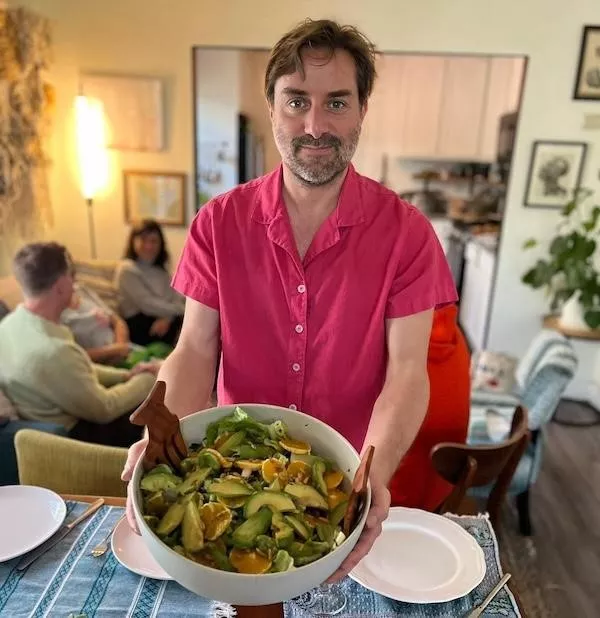

Michelle Davis is the recipe creator of Bad Manners. Michelle has published several books, among them Bad Manners: The Official Cookbook (#1 New York Times best seller) and Hungry as Hell (October 2023). With Matthew Holloway (photographer), she animates, with great sense of humor, an Instagram account and a wonderful website where you can find mouthwatering recipes via a user-friendly search engine. Basmati Stuffed Grilled pepper is already on my menu! Finally, you can also follow Michelle Davis with her new weekly newsletter called Stir the Pot and be part of a community on Substack.
Michelle is dedicated to the art of crafting vegan recipes, using fresh and seasonal ingredients. However, for Michelle, the conversation about cooking goes far beyond the kitchen table, as you will see. Food is a good entry to reflect on today’s world. But the first word that comes to my mind after the interview is “kindness”. As Bad Manners says, “It's OK to be soft”. Our conversation has been edited for length and clarity.
Can you tell us a little bit more about the philosophy behind your title “Bad Manners”?
I'm glad you picked up on that because the food that I cook is all vegan. I want to be conscious of the earth and my carbon footprint and all these things, but I don't want it to be pretentious. When people hear about vegan food, they think it's some snobby sort of thing. I wanted to counteract that with the swearing and the kind of goofy talk that I use in the recipe to make it more down to earth. You don't have to be a different kind of person to care about what you eat and to care about the planet. You can be you, just somebody with a silly sense of humor and who doesn't take themselves too seriously.
Maybe you could remind us of what vegan means?
Veganism means you just don't consume any animal products. It's like vegetarianism, except vegetarians still eat dairy products and eggs. It has kind of gotten popular in the last 20 to 30 years because of how deeply flawed our food system is. The dairy industry, in the United States in particular, same thing with the egg industry, is awful in the treatment of animals. A lot of people are taking that extra step and cutting that part out of their diet just based on animal welfare.
Was there an ethical decision behind cooking Vegan?
Growing up, my mom told me: “if you want a vegetarian dinner, you're just going to have to cook for yourself.” That's exactly how I started learning how to cook, because it was important enough to me. And so, when I left the house when I was 18, that's when I became vegan. For me, it's tied to my love of animals. It is not necessary to participate in our deeply flawed food system and so I want to protest by opting out.
Could you elaborate on the process of self-education?
You become much more aware of what is in your food, whether it's processed food or stuff someone makes for you. It's one of the most liberating things you can do as a person, to learn how to cook whether vegan or otherwise, because you deepen your relationship with food, you understand what goes into it, and you really get to own your palate. You aren't dependent on these huge corporations to cook for you; corporations shouldn't be cooking for you. People don't understand what's in their food anymore — we've become divorced from the preparation of our own food. It also makes you more cost effective. It makes you a more informed eater, and it makes you more conscious of the seasons as well, as you are eating seasonally and locally. You recognize that a watermelon purchased in January is usually horrible.
Can you talk about how you link food and feminism?
There is a huge place for feminism in the kitchen, because it helps all of us recognize that domestic labor is labor. One of the most important things that we do for ourselves, or for our family, is create the food that we eat, and it becomes part of our body. The fact that cooking is devalued in the domestic sphere but overvalued as entertainment and culture (and it's more of high culture when it's famous male chefs) reveals a disparity that must shrink. It is disingenuous for us to value it so much as entertainment, and then give it no value in our own home. We need to start recognizing cooking as labor and as a form of art. There is art in our Grandmother’s chicken soup.
Is it relevant to talk about queer cooking the same way today we talk about queer ecology?
I think it makes sense. I think in the conversation of cooking and food being a kind of art, wherever there is that kind of mode of self-expression, you find queer people. They have been in our kitchens, in our restaurants, doing all this forever. I think as we start to more deeply understand the queer identity just outside of gay and lesbian, and all the space in between, we'll see how many more people, both historically and present-day, fall into this idea of a queer ecology around food. Globalization has shrunk our world; our food is reflecting that, but queer people straddle so many identities, right? The more perspectives we bring in the kitchen, the better.
Food is an enormous source of waste and inequity. What education about food and cooking do we need, to make it more sustainable?
The first thing we need to realize is that we currently produce enough food on the planet to feed everyone. The issue is distribution. When we have abundance at our market, that means someone else doesn't. As wonderful as it is to have so many things at our fingertips, especially when it comes to fresh produce, we need things more equally distributed across the country. For people at home, they can do their part to reduce food waste by buying seasonally. So you're not getting strawberries that were flown in from Ecuador because that's not good for the planet, and they're not going to taste that good. Eating seasonally is a great way to reduce waste and to reduce your carbon footprint. Cooking at home is another great way, because you're not going to get lentils with all this giant packaging, right? That's another way to reduce waste—buying things in bulk and purchasing ingredients, instead of purchasing pre-packaged foods, as they often come highly processed. Shop realistically too. For example, frozen ingredients have gotten so much better. I'm not saying go buy frozen lasagna, but do buy frozen corn or frozen fruit.
What is your “star” produce right now?
The carrots are delicious right now. They're very, very sweet. And here in California, we get wonderful artichokes in March, and there is nothing better. And to bring spring a little faster, I like to parboil or steam them and then finish them on the grill. I serve them with a little dipping sauce. You can make some braised carrots on the side with, like, an herb salad, which would be super, super delicious and bright. You can see the hopefulness for the warming days ahead.
When Mathieu Bonin isn’t teaching philosophy at the French School, he volunteers with the Central Group, leading Trash Talk Saturdays and being its Conservation Chair. [header image: Mathieu Bonin, California Citrus & Almond Salad - recipe here ]